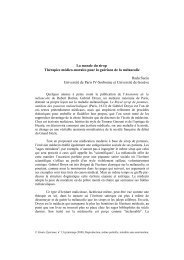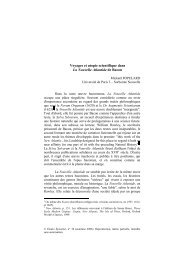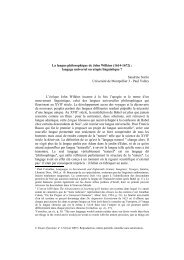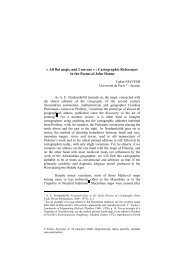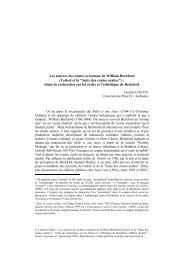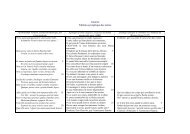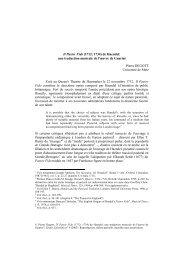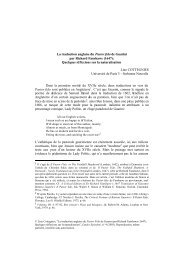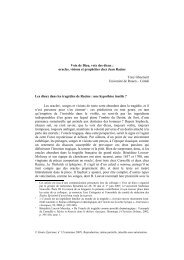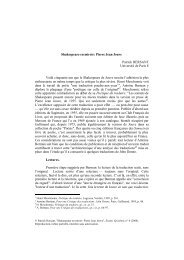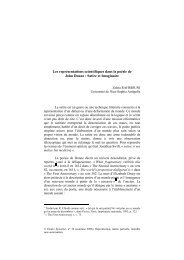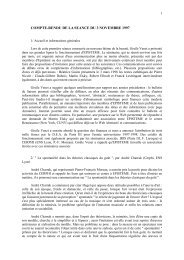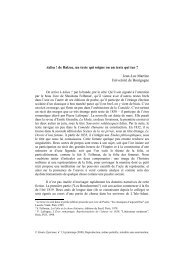â Lecture de The Widow Ranter d'Aphra Behn (1690): Illusions et ...
â Lecture de The Widow Ranter d'Aphra Behn (1690): Illusions et ...
â Lecture de The Widow Ranter d'Aphra Behn (1690): Illusions et ...
You also want an ePaper? Increase the reach of your titles
YUMPU automatically turns print PDFs into web optimized ePapers that Google loves.
106“ <strong>Lecture</strong> <strong>de</strong> <strong>The</strong> <strong>Widow</strong> <strong>Ranter</strong> <strong>d'Aphra</strong> <strong>Behn</strong> (<strong>1690</strong>):<strong>Illusions</strong> <strong>et</strong> désillusions ”Claire BOULARD(Université <strong>de</strong> Paris 3 - Sorbonne Nouvelle)Écrite vraisemblablement en 1688, peu <strong>de</strong> temps avant le décès <strong>d'Aphra</strong><strong>Behn</strong>, mais aussi quelques mois avant la Glorieuse Révolution <strong>et</strong> la fuite du roiJacques II, <strong>The</strong> <strong>Widow</strong> <strong>Ranter</strong>; Or, <strong>The</strong> History of Bacon in Virginia renoue avec legenre <strong>de</strong> la tragi-comédie. Aphra <strong>Behn</strong> avait en eff<strong>et</strong> débuté sa carrière <strong>de</strong>dramaturge en écrivant <strong>The</strong> Forced Marriage (1670): l’emploi renouvelé <strong>de</strong> cegenre dans <strong>The</strong> <strong>Widow</strong> <strong>Ranter</strong> signale l'ambiguïté <strong>de</strong> c<strong>et</strong>te pièce en cinq actesfondée sur la dualité 1 .Le titre en fournit une première illustration, qui mêle la fiction (“story”) àla réalité historique (“history”) <strong>de</strong> la rébellion menée par le général Bacon enVirginie, qui eut lieu en 1676. La Virginie, colonisée <strong>et</strong> gérée <strong>de</strong>puis la fondation<strong>de</strong> Jamestown par les Anglais en 1607 était sous la coupe d'un gouverneur désignépar le roi d'Angl<strong>et</strong>erre <strong>et</strong> aidé d'un conseil. Dans les années 1670, elle était alorsgouvernée par Lord Berkeley. Celui-ci dut faire face à <strong>de</strong>s accusationsd'incompétence <strong>et</strong> <strong>de</strong> mollesse puis à une rébellion organisée par Nathaniel Bacon,fils d'un squire du Suffolk, qui, après avoir fait faillite en Angl<strong>et</strong>erre, s'installa dansle comté d'Henrico en Virginie où il ach<strong>et</strong>a <strong>de</strong>s terres. Dans son manifeste “theDeclaration of the People”, Bacon dénonça l'incapacité du gouvernement colonial àprotéger les colons <strong>et</strong> leurs terres <strong>de</strong>s raids indiens. Un grand nombre <strong>de</strong> colons lesoutinrent <strong>et</strong> entreprirent <strong>de</strong> se faire justice eux-mêmes. Ce fut vite la guerreouverte avec Berkeley. Bacon prit Jamestown, déposa Berkeley qui reprit bientôt laville. La révolte cessa subitement lorsque Bacon, atteint d'une fièvre malignemourut. Les représailles <strong>de</strong> Berkeley contre ses partisans furent féroces 2 .1 L'édition utilisée <strong>de</strong> <strong>The</strong> <strong>Widow</strong> <strong>Ranter</strong> est celle publiée par Jan<strong>et</strong> Todd dans Oroonoko, <strong>The</strong> Roverand Other Works, London, Penguin, 1992. Elle sera référencée sous l'abréviation WR.2 Sur c<strong>et</strong>te rébellion, lire l'ouvrage <strong>de</strong> Bernard W. Sheehan, Savagism and Civility. Indians andEnglishmen in Colonial Virginia, Cambridge, Cambridge UP, 1980. Lire aussi le rapport rédigé enoctobre 1676 par le conseil privé du roi, qui rend compte <strong>de</strong> la rébellion après avoir dépêché <strong>de</strong>senquêteurs en Virginie. Ce rapport “A True Narrative of the Rise, Progress, and Cessation of the LateRebellion in Virginia.” est publié dans son intégralité, <strong>de</strong> même que la déclaration <strong>de</strong> Bacon, parAaron R. Wal<strong>de</strong>n, en appendice à son édition <strong>de</strong> <strong>The</strong> <strong>Widow</strong> <strong>Ranter</strong>. A Tragi-Comedy (New York,© Claire Boulard, “ <strong>Lecture</strong> <strong>de</strong> <strong>The</strong> <strong>Widow</strong> <strong>Ranter</strong> d’Aphra <strong>Behn</strong> (1688): <strong>Illusions</strong> <strong>et</strong> désillusions ”, Etu<strong>de</strong>sEpistémè, n° 2 (2002). Reproduction, même partielle, interdite sans autorisation.
108“ <strong>Lecture</strong> <strong>de</strong> <strong>The</strong> <strong>Widow</strong> <strong>Ranter</strong> d’Aphra <strong>Behn</strong> ”d'un personnage clairement ridicule 5 . Elle annonce ainsi une comédie dans la lignée<strong>de</strong> <strong>The</strong> Country Wife <strong>de</strong> Wycherley (1675) ou <strong>de</strong> <strong>The</strong> Man of Mo<strong>de</strong> (1676)d’Etherege, alors que le contenu en est infini moins ludique.Ensuite, il semble qu'Aphra <strong>Behn</strong> joue avec les conventions du genre tragicomiqu<strong>et</strong>elles qu'elles avaient été définies par Fl<strong>et</strong>cher 6 . La tragi-comédie est ungenre où l'on frôle la catastrophe, mais où elle ne se réalise pas. Ici, le hérosprincipal, Bacon, meurt, <strong>de</strong> même que sa reine. La pièce, certes, s'achève sur undénouement heureux: le r<strong>et</strong>our à la paix <strong>et</strong> l’annonce <strong>de</strong> plusieurs mariages. Maisl'absence totale <strong>de</strong> référence aux morts <strong>et</strong> aux drames lors <strong>de</strong> la réconciliationgénérale contredit l'importance <strong>de</strong> l'intrigue tragique qu'Aphra <strong>Behn</strong> a tant mise enavant. La comédie reprend ses droits <strong>de</strong> manière artificielle. Enfin, il est trèsdifficile <strong>de</strong> trouver le cœur, voire le tournant <strong>de</strong> la pièce. Les rebondissements sontnombreux, presque constants, <strong>de</strong> même que les r<strong>et</strong>ournements. Les personnages serenient fréquemment, ce qui confère à l'ensemble l'impression d'une instabilitépermanente, plus que <strong>de</strong> comique. Sans doute peut-on y lire un commentairenégatif sur ce nouveau mon<strong>de</strong> qu'est la Virginie, qui ne semble offrir aucune issuehonorable aux insatisfaits du nouvel ordre anglais 7 . D'emblée, on peut donc penserque la dramaturge joue avec les conventions <strong>et</strong> les illusions pour mieux dénoncer lamutabilité <strong>et</strong> la perte <strong>de</strong> repères <strong>de</strong> ce mon<strong>de</strong>. On assiste notamment au travers d'unjeu <strong>de</strong> miroir entre l'intrigue sentimentale <strong>et</strong> l'intrigue politique à une subversion duhéros aristocratique au profit d'un comique <strong>de</strong> faça<strong>de</strong> masquant ledésenchantement. L'illusion comique couvrirait alors la désillusion d'une poétesseen fin <strong>de</strong> vie, bien consciente <strong>de</strong> la déca<strong>de</strong>nce du mon<strong>de</strong> <strong>et</strong> <strong>de</strong>s valeurs héroïquesassociées aux idées tories <strong>et</strong> royalistes qui lui sont chères.5 Pour une définition <strong>de</strong> “ranter”, voir la page 7.6 Dans son essai “To the Rea<strong>de</strong>r” qu'il avait écrit pour justifier sa pièce <strong>The</strong> Faithful Shepher<strong>de</strong>ss,Fl<strong>et</strong>cher définissait le genre ainsi: “A tragie-comedie is not so called in respect of mirth and killing,but in respect it wants <strong>de</strong>aths, which is inough to make it no tragedie, y<strong>et</strong> brings some neere it, whichis inough to make it no comedie: which must be a representation of familiar people, with such kin<strong>de</strong>of trouble as no life questioned, so that a God is as lawfull in this as in a tragedie, and meane peopleas in a comedie” (<strong>The</strong> Faithful Shepher<strong>de</strong>ss, éd. Cyrus Hoy, éditeur général Fredson Bowers, <strong>The</strong>Dramatic Works in the Beaumont and Fl<strong>et</strong>cher Canon, Cambridge, Cambridge UP, 1976, 3: 497).7 Aphra <strong>Behn</strong> est <strong>de</strong> ceux-là, puisqu'elle avait <strong>de</strong>s convictions “ tories ” <strong>et</strong> soutenait Jacques II. Sereporter à la biographie <strong>de</strong> Jan<strong>et</strong> Todd, <strong>The</strong> Secr<strong>et</strong> Life of Aphra <strong>Behn</strong>, London, André Deutsch, 1996.© Claire Boulard / Etu<strong>de</strong>s Epistémè.
109Claire Boulard1. Bacon ou la subversion du héros.Si la première scène <strong>de</strong> <strong>The</strong> <strong>Widow</strong> <strong>Ranter</strong> présente d'abord la veuve puisensuite Bacon <strong>et</strong> ses initiatives politiques, il semble que la rébellion prime surl'intrigue sentimentale. En conséquence, malgré le titre, Bacon semble être le vraihéros <strong>de</strong> l'histoire. En eff<strong>et</strong>, <strong>de</strong> la première scène où Friendly explique à son amiHazard l'origine du conflit entre Bacon <strong>et</strong> le conseil <strong>de</strong> Virginie 8 , à la scène 4 <strong>de</strong>l'acte V où Bacon trépasse, la pièce narre l'évolution <strong>de</strong> c<strong>et</strong>te guerre civile qui peu àpeu touche tous les personnages, femmes comprises 9 . L'action <strong>de</strong>s rebelles <strong>et</strong> celle<strong>de</strong> leur Général sont donc un ressort essentiel <strong>de</strong> l'intrigue <strong>et</strong> désignentnaturellement Bacon comme le personnage principal.L'image <strong>de</strong> Bacon que la pièce m<strong>et</strong> en scène renforce encore le sentimentqu'il est le héros. Bacon s'illustre par son courage, sa vaillance, son honnêt<strong>et</strong>é, sonrespect du co<strong>de</strong> <strong>de</strong> l'honneur <strong>et</strong> du co<strong>de</strong> amoureux. Il tombe maintes fois dans <strong>de</strong>sembusca<strong>de</strong>s 10 , mais réagit en soldat, avec courage. Il <strong>de</strong>vance même le danger, ense présentant à ses ennemis en pleine réunion <strong>de</strong> conseil 11 . Il connaît les co<strong>de</strong>s <strong>de</strong> laguerre <strong>et</strong> <strong>de</strong> la noblesse. Ainsi, lorsqu'il combat le roi indien, il lui laisse seschances <strong>et</strong> veut le faire soigner 12 . De plus, il incarne les valeurs aristocratiques. Ilrespecte les titres <strong>et</strong> méprise la racaille qui a fait fortune <strong>et</strong> qui occupe <strong>de</strong>s postes <strong>de</strong>pouvoir au sein du conseil. Il incarne la cause juste face à un conseil corrompu <strong>et</strong>injuste. Il respecte les femmes <strong>et</strong> donne l'ordre à ses hommes <strong>de</strong> traiter lesprisonnières correctement 13 . Enfin, il m<strong>et</strong> fin à ses jours par amour <strong>et</strong> lorsqu'il croitsa cause perdue 14 . C'est un homme qui incarne l'absolu <strong>de</strong> la figure aristocratiqueanglaise. Il représente les idéaux royalistes d'amour <strong>et</strong> d'honneur auxquelscroyaient les partisans <strong>de</strong> Charles Ier, puis ceux <strong>de</strong> Jacques II.Bacon a un beau rôle tragique, <strong>de</strong> surcroît inspiré <strong>de</strong> Cassius 15 . À la scène1, on le présente comme un homme qui a étudié les vies <strong>de</strong>s Romains “studying thelives of the Romans” 16 . Il a l'humeur sombre <strong>de</strong> Cassius: il est un homme en colère,8 WR. I. 1, p 257.9 Les armées <strong>de</strong> Bacon font prisonnières les femmes <strong>de</strong>s adversaires, telles Chrisante, la fille duGénéral, <strong>et</strong> Madame Surelove.10 WR. II. 3, p 279.11 WR. II. 1, p 272; II. 4, p 280. Il accomplira un acte similaire en se présentant <strong>de</strong>vant les soldats quiveulent le faire prisonnier contre rançon à l'acte III, scène 2, p 296.12 WR. IV. 2, p 303.13 WR. III. 2, p 298. “Believe me, ladies, You shall have honourable treatment here.”14 WR. V. 4, p 321.15 <strong>Behn</strong> est très influencée par Shakespeare.16 WR I. 1, p 256.© Claire Boulard / Etu<strong>de</strong>s Epistémè.
110“ <strong>Lecture</strong> <strong>de</strong> <strong>The</strong> <strong>Widow</strong> <strong>Ranter</strong> d’Aphra <strong>Behn</strong> ”gouverné par une humeur, la bile noire (“sullen melancholy” 17 ). Il est aussi un bonorateur. À la scène II du troisième acte, il harangue la foule <strong>et</strong> la r<strong>et</strong>ourne. Il tient lemême langage que le peuple. La comparaison avec Cassius est d'ailleurs explicitepuisque son second Daring déclare, à son chev<strong>et</strong>: “So fell the Roman Cassius, bymistake.” 18 Comme les héros tragiques, il endosse la faute originelle <strong>de</strong> sesancêtres. À la scène 1 <strong>de</strong> l'acte II, il explique au roi indien qu'il doit défendre lefruit <strong>de</strong> l'ingratitu<strong>de</strong> <strong>de</strong> ses pères <strong>et</strong> donc se battre pour <strong>de</strong>s terres mal acquises surles Indiens par ses ancêtres 19 . De même, il est celui qui subit une double tragédie entuant son amante, Semernia, la reine indienne. Il <strong>de</strong>vient alors fou <strong>de</strong> douleurcomme en témoigne l'acte IV.Néanmoins, Bacon est aussi un personnage ambigu, fait <strong>de</strong> contradictions.En premier lieu, il est une figure <strong>de</strong> l'ordre, mais il est puni par le conseil pourdésordre, car il a agi sans commission <strong>et</strong> s’est mis hors la loi. 20 Ensuite, il méprisela naissance obscure <strong>de</strong>s membres du conseil, mais il s'appuie sur le peuple qui lesoutient. Enfin, il est amoureux <strong>de</strong> l'ennemi indien, la reine Semernia.Aussi, lorsqu'il la tue, n'est-il pas, comme il le prétend, le jou<strong>et</strong> <strong>de</strong> divinitésmalveillantes. Il travaille au contraire à sa propre perte. Il est en eff<strong>et</strong> unpersonnage qui se forge une fiction glorieuse qu'il ne contrôle pas vraiment. Sonimagination – on est d'ailleurs frappé par la récurrence <strong>de</strong>s références à “fancy”dans les <strong>de</strong>scriptions du Général – est à la fois ce qui le construit comme héros <strong>et</strong> lacause <strong>de</strong> sa perte, car il ne mesure pas <strong>de</strong> manière rationnelle les difficultés, ni sespropres faiblesses. Il est un conquérant raté. Friendly le décrit comme une personnequi: “fancies it easy for ambitious men to aim at any pitch of glory”. Bacon estaussi l'homme qui s'éprend <strong>de</strong> Semernia, “fancying no hero ought to be without aprincess” (I. 1, p 257). Bacon lui-même s'interroge sur ses échecs en ces termes:“Why cannot I conquer the universe as well as Alexan<strong>de</strong>r? Or like anotherRomulus form a new Rome, and make myself adored?”( I. 1, p 256) Il se compareaussi à César, lorsqu'il tue le roi indien, <strong>et</strong> se dépeint comme un héros triste qui tued’autres héros 21 . Pour finir, il se compare à Hannibal lorsqu'il se suici<strong>de</strong> en avalantdu poison 22 . Sur son lit <strong>de</strong> mort, il est révélateur que Daring ne r<strong>et</strong>ienne pas lagran<strong>de</strong>ur <strong>de</strong> son geste mais plutôt l'absurdité d'un suici<strong>de</strong> à l'antique provoqué parl'erreur (“by mistake”). Ainsi, le décès <strong>de</strong> Bacon confirme la nature dévoyée <strong>de</strong> son17 WR I. 1, p 256.18 WR. V. 4, p 321.19 WR. II. 1, p 269.20 Friendly note le paradoxe dans la scène d 'exposition en expliquant à Hazard: “but now instead ofreceiving him as conqueror, we treat him as a traitor.” (I, 1 p 257)21 WR. IV. 2, p 303: il déclare: “and now like Caesar, I could weep over the hero I <strong>de</strong>stroyed myself.”22 WR. V. 4, p 321.© Claire Boulard / Etu<strong>de</strong>s Epistémè.
111Claire Boulardhéroïsme. La constance <strong>de</strong>s références moitié historiques <strong>et</strong> moitié mythiquesindique déjà au spectateur que son action politique repose sur une fondationinstable, l'imagination <strong>et</strong> l'illusion, <strong>et</strong> que par conséquent, ses valeurs <strong>et</strong> ses actionssont caduques.En eff<strong>et</strong>, Bacon se présente comme un chevalier. Il propose au roi indien<strong>de</strong> jouer son <strong>de</strong>stin en combat singulier, geste que Daring qualifie <strong>de</strong> “romantichumour.” (IV. 2, p 303) Il combat <strong>de</strong> plus pour sa dame, Semernia, tel un chevaliermédiéval. Son langage reflète également son côté dépassé. Lorsqu'il évoque sonamour pour la reine indienne, il utilise les images pétrarquisantes <strong>et</strong> surannées <strong>de</strong>l'amant transi:my very soul was havering at my lip, ready to have discovered all its secr<strong>et</strong>s. Butoh! I dread to tell her of my pain, and when I would, an awful trembling seizes me,and she can only from my dying eyes, read all the sentiments of my captive heart.(II. 1, p 270)La noblesse <strong>et</strong> les principes <strong>de</strong> gran<strong>de</strong>ur sont <strong>de</strong>s fictions qui <strong>de</strong> plus l'engagent àcomm<strong>et</strong>tre <strong>de</strong>s erreurs puisque son langage <strong>et</strong> ses actions sont vidés <strong>de</strong> réalité <strong>et</strong>donc <strong>de</strong> sens. Ainsi, Bacon se méprend sur ses amis <strong>et</strong> ses ennemis. Il croit sincèreDunce, un ancien maréchal ferrant qui est un faux prêtre <strong>et</strong> qui a dressé le conseilcontre lui. Lorsque ses amis ém<strong>et</strong>tent <strong>de</strong>s doutes sur l'honnêt<strong>et</strong>é <strong>de</strong> Dunce, il estrévélateur que Bacon parodie inconsciemment la formule ironique <strong>et</strong> luci<strong>de</strong> <strong>de</strong>Marc-Antoine, orateur <strong>de</strong> talent, qui dans Julius Caesar <strong>de</strong> Shakespeare déclare:“But Brutus and Cassius are honourable men.” Bacon lui, en fait un propos sérieuxmais erroné qui s'applique au conseil: “you wrong the council, who of themselvesare honourable gentlemen.” (II. 1 p 271)De même, on s'aperçoit que Bacon, pour épris qu'il est <strong>de</strong>s fictionshéroïques, ne sait pas lire les fictions. Il ne reconnaît pas la reine déguisée enguerrier indien <strong>et</strong> la blesse mortellement. Par une sorte <strong>de</strong> pressentiment, Semerniaressent le froid <strong>de</strong> la mort quand il lui parle. “And ever when he spoke, my pantingheart, with a proph<strong>et</strong>ic fear in sighs replied, I shall fall such a victim to his eyes?”(II. 1, p 270) C'est en le voyant que la reine tombe amoureuse <strong>de</strong> Bacon. Mais c'esteffectivement aussi par les yeux <strong>de</strong> Bacon qu'elle sera assassinée, car ne lareconnaissant pas sous un déguisement masculin, il la frappera à mort. Baconincarne donc la mort parce qu'il ne sait pas déco<strong>de</strong>r son mon<strong>de</strong> <strong>et</strong> qu'il vit dansl'illusion. Enfin, il se suici<strong>de</strong> sur un faux rapport <strong>de</strong> Fearless, espion du conseil. Ilprend donc la fiction d'une défaite pour la réalité.En fait, sorte <strong>de</strong> double inversé <strong>de</strong> la veuve, Bacon est une sorte <strong>de</strong> <strong>Ranter</strong>r<strong>et</strong>ardé. Tel ces sectaires, connus pendant la guerre civile pour leurs harangues peu© Claire Boulard / Etu<strong>de</strong>s Epistémè.
112“ <strong>Lecture</strong> <strong>de</strong> <strong>The</strong> <strong>Widow</strong> <strong>Ranter</strong> d’Aphra <strong>Behn</strong> ”cohérentes 23 , il propose aux foules une vision d'un mon<strong>de</strong> nouveau qui serait fondéesur <strong>de</strong>s valeurs anciennes. Il est un millénariste dépassé, combattant pour un mon<strong>de</strong>ancien dont les valeurs reposent sur les principes <strong>de</strong> fictions chevaleresques. Lepersonnage <strong>de</strong> Bacon, <strong>de</strong> même que celui <strong>de</strong> son double masculin, le roi indien, luiaussi profondément pétri <strong>de</strong>s valeurs d'amour <strong>et</strong> du co<strong>de</strong> <strong>de</strong> l'honneur, trahit lanostalgie <strong>d'Aphra</strong> <strong>Behn</strong> pour ces valeurs aristocratiques.Toutefois, Bacon acquiert en même temps une dimension comique quisubvertit sa fonction héroïque. La part <strong>de</strong> folie du personnage transparaît dans c<strong>et</strong>teremarque d'un <strong>de</strong>s bouffons <strong>de</strong> la pièce, Whiff, qui l'écoute haranguer la foule <strong>de</strong>ssoldats: “the general speaks like a Gorgon.” (III. 2, p 296) Certes, la déclaration estcomique car elle trahit l'ignorance <strong>de</strong> Whiff qui à l'évi<strong>de</strong>nce confond les pouvoirsvisuel <strong>et</strong> oratoire <strong>de</strong> la gorgone. Mais elle traduit également la nature factice <strong>de</strong>l'héroïsme <strong>de</strong> Bacon. Par un jeu <strong>de</strong> renversement, <strong>de</strong> héros chevaleresque, il<strong>de</strong>vient un personnage mythique féminin <strong>de</strong>structeur qui n'est pas sans rappeler lamégère qu'est la veuve <strong>Ranter</strong>. Bacon <strong>de</strong>vient d'ailleurs un personnage inquiétantqui dérape vers la folie lorsque, furieux d'avoir laissé le roi indien s'échapper ilaccuse son lieutenant Daring <strong>de</strong> trahison:BACONSearch all the brakes, the furzes and the trees (...)We cannot do won<strong>de</strong>rs, sir.But you can run away.DARINGBACONDevant l'indignation <strong>de</strong> Daring, il se rétracte déclarant: “Forgive me, I'm mad.”(IV. 2, p 302).Si Bacon fait partie <strong>de</strong> ce nouveau mon<strong>de</strong> où, en théorie, on peut refaire lemon<strong>de</strong> 24 , il est à l'image <strong>de</strong> la colonie dirigée par <strong>de</strong>s malfrats corrompus, incapabled'imposer <strong>de</strong> son vivant ses valeurs héroïques. En mourant, Bacon se reniedéclarant: “while you are victors make a peace – with the English council – andnever l<strong>et</strong> ambition – love – or interest make you forg<strong>et</strong> as I have done – your duty –and allegiance – farewell” (V. 4, p 321). Ironiquement, en agissant <strong>de</strong> la sorte, il23 Pour plus <strong>de</strong> renseignements sur les <strong>Ranter</strong>s <strong>et</strong> les préjugés dont ils font l’obj<strong>et</strong>, se reporter auchapitre 10 <strong>de</strong> <strong>The</strong> World Upsi<strong>de</strong> Down: Radical I<strong>de</strong>as During the English Revolution, <strong>de</strong> ChristopherHill. Harmondsworth, Penguin, 1984 [1972].24 Hazard assure qu'il a traversé l'Atlantique pour: “begin the world withal”.© Claire Boulard / Etu<strong>de</strong>s Epistémè.
113Claire Boulardr<strong>et</strong>ourne au principe <strong>de</strong> réalité <strong>et</strong> ses consignes seront respectées après sa mort. Ilreprésente donc à la fois l'impossibilité <strong>de</strong> rétablir les valeurs passées maiségalement la mort du héros ancien modèle en tant que personnage dramatique.Est-ce à dire qu'il n'y a pas <strong>de</strong> vrai héros tragique dans <strong>The</strong> <strong>Widow</strong> <strong>Ranter</strong>?Ce type <strong>de</strong> héros existe mais son rôle est très court car il s'agit du roi indien.Victime <strong>de</strong> la fatalité <strong>et</strong> <strong>de</strong> l'arrivée <strong>de</strong>s colons qui ont pris les terres <strong>de</strong> ses parents,victime <strong>de</strong>s dieux qui le condamnent, <strong>de</strong> l'amour qui lui vole son épouse, <strong>et</strong> <strong>de</strong> sapropre incapacité à comprendre le double langage <strong>de</strong> l'oracle, il est synonyme <strong>de</strong>pur<strong>et</strong>é, mais d'une pur<strong>et</strong>é chevaleresque révolue: lui aussi est assassiné. À quiprofite alors la disparition du héros?Curieusement, Bacon transm<strong>et</strong> avant <strong>de</strong> mourir le titre <strong>de</strong> héros à sonlieutenant, Daring: “And is the enemy put to flight my hero?” (V. 3, p 321) Est-celà le nouveau héros que signale Aphra <strong>Behn</strong>? Daring est certes généreux <strong>et</strong> possè<strong>de</strong>un sens <strong>de</strong> la chevalerie, comme en témoigne sa clémence envers Friendly 25 . Deplus, contrairement à Bacon, il sait percevoir les fictions <strong>et</strong> ne se la isse pas berner.Il soupçonne à juste titre la traîtrise du conseil <strong>et</strong> en suivant Bacon <strong>de</strong> loin, luiperm<strong>et</strong> <strong>de</strong> se sortir <strong>de</strong> l'embusca<strong>de</strong> où il était tombé. (II. 1, p 271). De même,lorsque la veuve <strong>Ranter</strong> se déguise en soldat pour le suivre, il est capable <strong>de</strong>combattre la fiction par la fiction. Lorsqu'on lui révèle la mascara<strong>de</strong> <strong>de</strong> la veuve, ilprolonge le jeu <strong>et</strong> lui joue un tour en faisant d’elle un portrait satirique en saprésence. Il provoque alors la colère <strong>de</strong> la jeune femme <strong>et</strong> du même coup lecomique.Enfin, il est celui qui réintègre la société, <strong>et</strong> qui parvient à rester dans lalégalité <strong>de</strong>s institutions <strong>et</strong> fait le choix <strong>de</strong> la paix. Il <strong>de</strong>vient général <strong>et</strong> épouse laveuve. Mais il incarne un principe <strong>de</strong> réalité peu sympathique dans la mesure où ilépouse la veuve pour son argent <strong>et</strong> non par amour. De plus, Daring n'a qu'un rôlesecondaire <strong>de</strong> faire-valoir <strong>de</strong> Bacon <strong>et</strong> <strong>de</strong> la veuve.La pièce m<strong>et</strong> également en scène <strong>de</strong>s parodies <strong>de</strong> héros qui aspirent à lagran<strong>de</strong>ur sans toutefois en subir les avanies. Aussi sont-ils <strong>de</strong>s producteurs <strong>de</strong>comique car ils fabriquent <strong>de</strong>s fictions qui échouent au <strong>de</strong>rnier moment. Parmi cespersonnages, on trouve Dunce, Whiff <strong>et</strong> Whimsey, trois membres du conseil quiconstituent une fiction <strong>de</strong> pouvoir <strong>et</strong> <strong>de</strong> justice. À la scène 1 <strong>de</strong> l'acte III, ilsparticipent à une session du tribunal, où leur couardise, leur mauvaise foi <strong>et</strong> leurignorance éclatent au grand jour. C<strong>et</strong>te assemblée tourne à la farce lorsque les jugesvotent l'octroi d'un verre <strong>de</strong> punch supplémentaire. De même la réunion du conseil<strong>de</strong> Virginie montre que l'essence <strong>de</strong> la politique populaire n'est qu'une chimère. Les25 Daring fait soigner Friendly qu'il a blessé. Cf V. 1, p 313.© Claire Boulard / Etu<strong>de</strong>s Epistémè.
114“ <strong>Lecture</strong> <strong>de</strong> <strong>The</strong> <strong>Widow</strong> <strong>Ranter</strong> d’Aphra <strong>Behn</strong> ”conseillers se contredisent, complotent pour faire tomber Bacon dans un gu<strong>et</strong>-apens<strong>et</strong> l'exécuter. Ils représentent à la fois l'arbitraire, la malhonnêt<strong>et</strong>é <strong>et</strong> l'absenceabsolue <strong>de</strong> courage face à l'ennemi. Leur ridicule procure à la fois <strong>de</strong>s épiso<strong>de</strong>scomiques qui allègent les scènes plus tragiques <strong>et</strong> constitue un faire-valoir pourBacon <strong>et</strong> pour le roi indien.Une secon<strong>de</strong> catégorie <strong>de</strong> personnages émerge, qui représente les nouvellesvaleurs <strong>de</strong> l'Angl<strong>et</strong>erre <strong>de</strong> la fin du XVIIe siècle. Ce sont les p<strong>et</strong>its maîtres rouéstels Hazard ou Friendly, qui espèrent trouver fortune dans ce nouveau mon<strong>de</strong> entirant profit <strong>de</strong> son désordre. Méprisant toute activité professionnelle, ils se lancentdans <strong>de</strong>s intrigues sentimentales susceptibles <strong>de</strong> leur procurer une épouse <strong>et</strong> unedot. Leurs valeurs sont encore celles <strong>de</strong> l'aristocratie car ils respectent les rangs <strong>et</strong>les titres. Néanmoins, comme les conseillers, ils réussissent en usurpant leurposition. Hazard par exemple conquiert le cœur <strong>de</strong> la jeune veuve Surelove, en luifaisant croire qu'il est un parent du Colonel Surelove <strong>et</strong> recommandé par ce <strong>de</strong>rnier.Il joue ainsi sur l'éloignement, l'absence d'informations fiables inhérente auxcolonies. Si l'intrigue sentimentale réussit, elle repose sur le mensonge <strong>et</strong> laduplicité <strong>et</strong> est donc elle aussi productrice <strong>de</strong> comique. Ainsi Aphra <strong>Behn</strong> suggèreque la Virginie ne peut être synonyme <strong>de</strong> gran<strong>de</strong>ur ni ne peut constituer unealternative à la corruption anglaise 26 .Du même coup, Aphra <strong>Behn</strong> inscrit la rupture politique dans le genre tragicomique.À partir <strong>de</strong> la Restauration, <strong>de</strong> nombreuses tragi-comédies font référenceau régici<strong>de</strong> <strong>de</strong> Charles Ier <strong>et</strong> insistent sur la permanence du héros: dans la sphèrepolitique, Charles II avait remplacé Charles Ier <strong>et</strong> on r<strong>et</strong>rouvait la paix. Dans latragi-comédie, la comédie supplantait la tragédie dont elle se nourrissait 27 . <strong>The</strong><strong>Widow</strong> <strong>Ranter</strong>, au contraire, en se refermant sur un dénouement <strong>de</strong> paix sans héros,modifie le genre <strong>et</strong> signale l'incertitu<strong>de</strong> politique du temps autant qu'une évolutiondu genre. La comédie ne propose plus une issue politique à l'intrigue mais secantonne au domaine sentimental. Le héros tragique n'est plus magnifié ni célébrépar l'avènement d'un nouveau héros. Il est simplement remplacé par une héroïneridicule qui n'offre aucun espoir <strong>de</strong> ré<strong>de</strong>mption.26 Friendly affirmait à l'acte I. 1, p 256: “This country wants nothing but to be peopled with a wellbornrace to make it one of the best colonies in the world.”27 Voir par exemple la pièce <strong>de</strong> Dry<strong>de</strong>n, Astraea Redux (1660). Sur les caractéristiques <strong>de</strong> la tragicomédieà la Restauration, consulter Nancy Klein Maguire, Regici<strong>de</strong> and Restoration 1660-1671,Cambridge, Cambridge UP, 1992, p. 276.© Claire Boulard / Etu<strong>de</strong>s Epistémè.
116“ <strong>Lecture</strong> <strong>de</strong> <strong>The</strong> <strong>Widow</strong> <strong>Ranter</strong> d’Aphra <strong>Behn</strong> ”légale <strong>et</strong> <strong>de</strong> l'indépendance due à sa richesse, était une promesse d'érotisme tout ensignalant une fortune à dépouiller. On ne s'étonne donc pas qu'en bonne stratège,Aphra <strong>Behn</strong> ait choisi ce titre <strong>et</strong> donc mis en avant une figure secondaire maisridicule pour attirer les spectateurs.Or la pièce remplit les promesses du titre car la veuve est en eff<strong>et</strong> uneextravagante: c'est là son humeur principale, selon Friendly 31 . Personnage <strong>de</strong> basseextraction, elle fait partie <strong>de</strong> <strong>de</strong>ux mon<strong>de</strong>s: celui <strong>de</strong>s servantes <strong>et</strong> celui <strong>de</strong> la gentryauquel elle appartient <strong>de</strong>puis son mariage avec le colonel <strong>Ranter</strong>. C'est le décalageentre ses manières <strong>de</strong> servante <strong>et</strong> son statut <strong>de</strong> femme du mon<strong>de</strong> qui provoque lecomique. Être assez frustre, elle a gardé “som<strong>et</strong>hing of her primitive quality.” 32Aussi agit-elle comme un intermè<strong>de</strong> comique lorsqu'en visite chezMadame Surelove, elle offre un échantillon <strong>de</strong> ses manières. Elle fume beaucoup,boit du punch à la louche, <strong>et</strong> comme les “ranters” prétend que cela favorisel'élévation spirituelle <strong>et</strong> la bonne humeur:Some pipes and a bowl of punch, you know my humour, madam, I must smokeand drink in a morning, or I am maukish all day. (...) [P]unch refreshes and cheersthe heart. (I. 3, p 265)Elle organise un dîner où les excès <strong>de</strong> boisson <strong>et</strong> <strong>de</strong> table sont permis. De manièregénérale, elle jure, porte le pantalon, va à la guerre, se bat <strong>et</strong> est prête à souffl<strong>et</strong>erson amant. Elle apprécie la compagnie d'hommes galants. Elle va jusqu'à surveillerson amant à qui elle déclare sa flamme. On la voit même sur le champ <strong>de</strong> batailledétrousser <strong>de</strong>s hommes laissés pour morts. (V. 3, p 320)Comme figure <strong>de</strong> vie, elle est aussi le double inversé <strong>de</strong> Semernia. Si lareine indienne est une sauvage raffinée, la veuve est une Lady barbare dans seshabitu<strong>de</strong>s quotidiennes. Toutes <strong>de</strong>ux ont un mari défunt. Mais Sermenia le pleure,prisonnière qu'elle est <strong>de</strong>s co<strong>de</strong>s <strong>de</strong> vertu. La veuve <strong>Ranter</strong> au contraire se félicite<strong>de</strong> son veuvage:SURELOVEYou have reason to praise an old man, who died and left you worth fifty thousandpound.RANTERAye gad – and what's b<strong>et</strong>ter, swe<strong>et</strong>-heart, died in good time too, and left me youngenough to spend this fifty thousand pound in b<strong>et</strong>ter company – rest his soul for thattoo. (I. 3, p 266)31 WR 1. 1, p 255.32 WR. Friendly la décrit ainsi dans l'acte I, scène 1, p 255.© Claire Boulard / Etu<strong>de</strong>s Epistémè.
117Claire BoulardDans la lignée <strong>de</strong> l'héroïne <strong>de</strong> <strong>The</strong> Country Wife, censée représenter lafigure comique d'une femme <strong>de</strong> province ignorante <strong>et</strong> naïve, la veuve <strong>Ranter</strong> estune caricature qui montre que la société coloniale est une parodie monstrueuse <strong>de</strong>la société anglaise <strong>et</strong> <strong>de</strong> ses manières. Dans ce mon<strong>de</strong>, les héroïnes per<strong>de</strong>nt leurféminité <strong>et</strong> r<strong>et</strong>ournent à un état <strong>de</strong> nature bien inférieur à celui que sont censésreprésenter les indiens. La veuve s'oppose donc par son activité aux figuresféminines traditionnelles, telles Chrisante, qui obéit à son père <strong>et</strong> est faiteprisonnière <strong>de</strong>s rebelles. Elle constitue une anti-héroïne qui défie les conventions <strong>et</strong>s'affranchit <strong>de</strong>s règles morales. Représente-t-elle pour autant une figure positive?La veuve va <strong>de</strong> l'avant <strong>et</strong> contrairement à Semernia, réussit dans sesentreprises. Elle se déguise <strong>et</strong> parvient à pénétrer dans le camp <strong>de</strong>s rebelles <strong>et</strong> àr<strong>et</strong>rouver Daring sans se faire molester. De même, elle conquiert Daring <strong>et</strong>l'épouse, le détournant ainsi <strong>de</strong> sa rivale Chrisante. Cependant, bien que que sonnom <strong>et</strong> ses manières renvoient à une “ secte ” disparue <strong>et</strong> à une époque révolue, laveuve n'offre aucune revendication religieuse 33 , sociale, politique ou sexuelle. Elledénonce mais ne propose pas <strong>de</strong> solution ni <strong>de</strong> modèle. La veuve est un personnaged'une gran<strong>de</strong> lucidité qui perm<strong>et</strong> à Aphra <strong>Behn</strong> d'insister davantage encore sur ladéca<strong>de</strong>nce <strong>de</strong> la Virginie. Tel le bouffon, elle est figure <strong>de</strong> la vérité, <strong>et</strong> d'une véritépeu agréable. Ainsi est elle parfaitement consciente <strong>de</strong> son propre statut <strong>de</strong> bien àvendre:RANTERWhat you are like all the young fellows, the first thing they do when they come toa strange place, is to enquire what fortunes there are (...) we rich widows are thebest commodity this country affords (...). (I. 3, p 267)De même, elle voit les travers <strong>de</strong>s juges du tribunal, <strong>et</strong> en particulier leurpoltronerie: “I see nothing in the times but a company of coxcombs that fearwithout a cause.” (II. 2, p 276) De plus, Aphra <strong>Behn</strong> n'élève pas la veuve au rang<strong>de</strong> modèle à suivre. La veuve ne revendique pas sa différence. Lorsque Daring ladécrit comme une personne insolente, souvent ivre, gran<strong>de</strong> fumeuse, <strong>et</strong> femmefacile 34 , elle considère le portrait comme une caricature <strong>et</strong> s'en offusque. Le portraitest cependant assez fidèle au personnage. La veuve ne propose pas sa liberté <strong>de</strong>mœurs comme un exemple. Elle cherche simplement à s'intégrer dans la société ensacrifiant sa fortune à un homme à son goût.33 Les “ranters” considéraient Dieu comme le créateur d'un mon<strong>de</strong> naturel dont on doit jouir.34 WR. IV. 3, p 310. Friendly en fait un portrait similaire dans la scène d'exposition: “she is a greatgallant (...). ” (p 255)© Claire Boulard / Etu<strong>de</strong>s Epistémè.
118“ <strong>Lecture</strong> <strong>de</strong> <strong>The</strong> <strong>Widow</strong> <strong>Ranter</strong> d’Aphra <strong>Behn</strong> ”Ces caractéristiques en font une sorte d'image inversée <strong>de</strong> Bacon. Commelui, qui est une figure tragique dévoyée, elle introduit une dimension ironique aucomique <strong>de</strong> son rôle. De plus, comme lui, elle est un personnage hors normes. Elleoscille entre les <strong>de</strong>ux sexes, ainsi qu'entre le mon<strong>de</strong> du sentiment <strong>et</strong> celui <strong>de</strong> laguerre. Enfin, elle aussi aime le camp opposé dans la mesure où elle est amoureuse<strong>de</strong> Daring, second <strong>de</strong>s rebelles. Contrairement à Bacon, cependant, elle ne se faitpas d’illusion. Son cynisme lui perm<strong>et</strong> <strong>de</strong> survivre dans ce nouveau mon<strong>de</strong>.Les critiques s'accor<strong>de</strong>nt pour voir dans la veuve une figure <strong>d'Aphra</strong> <strong>Behn</strong>elle-même 35 . Sa fougue <strong>et</strong> son désir d'aller <strong>de</strong> l'avant peuvent confirmer c<strong>et</strong>tehypothèse. Néanmoins, le veuve est une parvenue dont les co<strong>de</strong>s sont en ruptureavec ceux auxquels Aphra <strong>Behn</strong> croyait: les co<strong>de</strong>s d'honneur “ tory ”. Aussi peutonvoir dans ce personnage autant une mise en gar<strong>de</strong> contre ce nouveau mon<strong>de</strong> quele visage masqué <strong>et</strong> grotesque <strong>de</strong> la désillusion. Plus généralement, la chargenégative <strong>de</strong> la pièce contre la société contemporaine fut sans doute perçue par lespremiers lecteurs <strong>de</strong> <strong>The</strong> <strong>Widow</strong> <strong>Ranter</strong> car, lorsqu'elle fut jouée pour la premièrefois en 1689, après la mort <strong>de</strong> son auteur, <strong>de</strong>s scènes entières furent suppriméestelles que celle représentant le tribunal du Virginie 36 . Tragi-comédie en mutation,<strong>The</strong> Widdow <strong>Ranter</strong> est une pièce en <strong>de</strong>mi-teinte qui, pour être moins ouvertementhostile aux “ Whigs ” que <strong>The</strong> Roundhead (1681) ne s'inscrit pas moins dans lesillage du théâtre <strong>de</strong> propagan<strong>de</strong> si courant pendant la Restauration. L'échec <strong>de</strong> lapièce confirme néanmoins la fin <strong>de</strong>s valeurs qu'Aphra <strong>Behn</strong> tentait une <strong>de</strong>rnièrefois <strong>de</strong> défendre.35 C'est la thèse <strong>de</strong> Aaron Wal<strong>de</strong>n <strong>et</strong> <strong>de</strong> Jan<strong>et</strong> Todd.36 Jan<strong>et</strong> Todd, <strong>The</strong> Works of Aphra <strong>Behn</strong>, 7: 290. Selon Jan<strong>et</strong> Todd, les omissions peuvent être aussidues au fait que l'auteur n'était plus là pour superviser la mise en scène.© Claire Boulard / Etu<strong>de</strong>s Epistémè.
119Claire BoulardANNEXE<strong>The</strong> <strong>Widow</strong> <strong>Ranter</strong>d’Aphra <strong>Behn</strong>Edition utilisée: <strong>The</strong> Widdow <strong>Ranter</strong> or, <strong>The</strong> History of Bacon in Virginia. ATragicomedy (Londres, <strong>1690</strong>)1. Acte I, Scène 3 (p. 10-12).Sureloves House.Enter <strong>Ranter</strong> and her Coachman.RANTERHere Jefery, ye Drunken Dog, s<strong>et</strong> your Coach and Horses up, I'le not go tillthe Cool of the Evening, I love to ri<strong>de</strong> in Fresco...Enter a boy.COACHMANYes after hard drinking (asi<strong>de</strong>) — it shall be done, Madam.RANTERHow now Boy, is Madam Surelove at home?Yes Madam.Go tell her I am here, Sirrah.Who are you pray, forsooth?BOYRANTERBOY© Claire Boulard / Etu<strong>de</strong>s Epistémè.
120“ <strong>Lecture</strong> <strong>de</strong> <strong>The</strong> <strong>Widow</strong> <strong>Ranter</strong> d’Aphra <strong>Behn</strong> ”RANTERWhy, you Son of Baboone, don't you know me?BOYNo Madam, I came over but in the last Ship.RANTERWhat from Newgate or Bri<strong>de</strong>well? from shoving the Fumbler, Sirrah, Lifting orFiling the Cly?BOY.I don't un<strong>de</strong>rstand this Country-Language forsooth, y<strong>et</strong>.RANTERYou Rogue, 'tis what we transport from England first — go ye Dog, go tell yourLady, the <strong>Widow</strong> <strong>Ranter</strong> is come to dine with her — I hope I shall not find thatRogue Darcing here. Sniveling after Mrs. Chrisante;Exit Boy.If I do, by the Lord, I'le lay him thick. Pox on him why should I love the Dog,unless it be a Judgment upon me.Enter Surelove and Chrisante.— My <strong>de</strong>ar Jewell how do'st do? — as for you Gentlewoman you are my Rivall,& I am in rancour against you till you have renounc'd my Dancing.CHRISANTE.All the Interest I have in him Madam, I resign to you.RANTERAy — but your house lying so near the Camp, gives me Mortal fears — butpr<strong>et</strong>hee how thrives thy Amour with honest Friendly?CHRISANTE.As well as an Amour can, that is absolutely forbid by a Father on one si<strong>de</strong>,and pursu'd by a good resolution on the other.© Claire Boulard / Etu<strong>de</strong>s Epistémè.
121Claire BoulardRANTERHay Gad, I'le warrant for Friendlys resolution, what, tho' his Fortune be notanswerable to yours, we are bound to help one another — here Boy some Pipes anda Bowle of Punch, you know my humour Madam, I must Smoke and Drink in aMorning, or I am Maukish all day.SURELOVEBut will you drink Punch in a Morning?RANTERPunch, 'tis my Mornings draught, my Table-drink, my Treat, my Regalio, my everything, ah my <strong>de</strong>ar Surelove, if thou woud'st but refresh & Chear thy heart withPunch in a morning, thou wou'dst not look thus Clowdy all the Day.Enter Pipes and a Great Bowl, she falls to smoakingSURELOVEI have reason Madam to be Melancholy, I have receiv'd a L<strong>et</strong>ter from my Husband,who gives me an account that he is worse in England than when he was here, sothat I fear I shall see him no more, the Doctors can do no good on him.RANTERA very good hearing. I won<strong>de</strong>r what the Devill thou hast done with him so long? anold fusty weather-beaten Skell<strong>et</strong>on, as dri'd as Stock-fish, and much of the Hue. —come, come, here's to the next, may he be young, Heaven, I beseech thee.Drinks.SURELOVEYou have reason to praise an old man, who dy'd and left you worth fifty thousandPound.RANTERAy Gad — and what's b<strong>et</strong>ter Swe<strong>et</strong>-heart, dy'd in good time too, and left me youngenough to spend this fifty thousand pound in b<strong>et</strong>ter Company — rest his Soul forthat too.CHRISANTE.I doubt 'twill be all laid out in Bacons Mad Lieutenant Generall Daring© Claire Boulard / Etu<strong>de</strong>s Epistémè.
122“ <strong>Lecture</strong> <strong>de</strong> <strong>The</strong> <strong>Widow</strong> <strong>Ranter</strong> d’Aphra <strong>Behn</strong> ”RANTERFaith I think I could lend it the Rogue on good Security.CHRISANTE.What's that, to be bound Body for Body?RANTERRather that he should love no bodies Body besi<strong>de</strong>s my own, but my Fortuneis too good to trust the Rogue, my money makes me an Infi<strong>de</strong>ll.CHRISANTE.You think they all love you for that:RANTERFor that, Ay what else? if it were not for that, I might sit still and sigh,and cry out, a Miracle! a Miracle! at sight of a Man within my doors:Enter Maid.MAIDMadam here's a young Gentleman without would speak with you.SURELOVEWith me, sure thou'rt mistaken, is it not Friendly?No Madam 'tis a Stranger;'Tis not Dareing that Rogue, is it?No Madam;MAIDRANTERMAIDRANTER.Is he handsome? does he look like a Gentleman?MAID© Claire Boulard / Etu<strong>de</strong>s Epistémè.
123Claire BoulardHe's handsome and seems a Gentleman.RANTERBring him in then, I hate a conversation without a Fellow, — hah — a goodhandsome Lad in<strong>de</strong>ed:Enter Hazard with a L<strong>et</strong>ter.With me Sir would you speak?If you are Madam Surelove.So I am call'd.SURELOVEHAZARDSURELOVEHAZARDMadam I am newly arriv'd from England, and from your Husband my kinsmanbring you this —Gives a L<strong>et</strong>ter.Please you to sit Sir;RANTERHAZARDShe's extreamly handsome — asi<strong>de</strong> — sits downCome Sir will you Smoke a Pipe?I never do Madam —RANTERHAZARDRANTEROh fy upon't you must learn then, we all smoke here, 'tis a part of good breeding,— well, well, what Cargo, what goods have ye? any Poynts, Lace, rich Stuffs,© Claire Boulard / Etu<strong>de</strong>s Epistémè.
124“ <strong>Lecture</strong> <strong>de</strong> <strong>The</strong> <strong>Widow</strong> <strong>Ranter</strong> d’Aphra <strong>Behn</strong> ”Jewells; if you have I'le be your Chafferer, I live hard by, any body will direct youto the widow <strong>Ranter</strong>s.HAZARDI have already heard of you, Madam.RANTERWhat you are like all the young Fellows, the first thing they do when they come toa strange place, is to enquire what Fortunes there are.Madam I had no such Ambition:HAZARDRANTERGad, then you're a fool, Sir, but come, my service to you; we rich Widdows are thebest Commodity this Country affords, I'le tell you that.2. Acte II. Scène 1. (p. 13-14)A Pavillion. Discovers the Indian King and Queen sitting in State, with Guards ofIndians, Men and Women attending: to them Bacon richly dress'd, atten<strong>de</strong>d byDaring, Fearless, and other Officers, he bows to the King and Queen, who rise toreceive him.KINGI am sorry Sir, we me<strong>et</strong> upon these terms, we who so often have embrac'd asfriends.BACONHow charming is the Queen? (asi<strong>de</strong>.) War, Sir, is not my bus'ness, nor mypleasure: Nor was I bred in Arms; My Country's good has forc'd me to assume aSoldiers life: And 'tis with much regr<strong>et</strong> that I Employ the first effects of it againstmy Friends; Y<strong>et</strong> whilst I may — Whilst this Cessation lasts, I beg we mayexchange those Friendships, Sir, we have so often paid in happier Peace.KING© Claire Boulard / Etu<strong>de</strong>s Epistémè.
125Claire BoulardFor your part, Sir, you've been so Noble, that I repent the fatall difference thatmakes us me<strong>et</strong> in Arms. Y<strong>et</strong> tho' I'm young I'm sensible of Injuries; And oft haveheard my Grandsire say — That we were Monarchs once of all this spaciousWorld; Till you an unknown People landing here, Distress'd and ruin'd by<strong>de</strong>structive storms, Abusing all our Charitable Hospitality, Usurp'd our Right, andma<strong>de</strong> your friends your slaves.BACONI will not justify the Ingratitu<strong>de</strong> of my fore-fathers, but finding here myInheritance, I am resolv'd still to maintain it so, And by my sword which first cutout my Portion, Defend each inch of Land with my last drop of Bloud.QUEENEv'n his threats have charms that please the heart: (asi<strong>de</strong>)KINGCome Sir, l<strong>et</strong> this ungratefull <strong>The</strong>me alone, which is b<strong>et</strong>ter disputed in the Field.QUEENIs it impossible there might be wrought an un<strong>de</strong>rstanding b<strong>et</strong>wixt my Lord andyou? 'Twas to that end I first <strong>de</strong>sired this truce, My self proposing to be Mediator,To which my Lord Cavarnio shall agree, Could you but Con<strong>de</strong>scend — I knowyou're Noble: And I have heard you say our ten<strong>de</strong>r Sex could never plead in vain.BACONAlas! I dare not trust your pleading Madam? A few soft words from such aCharming mouth would make me lay the Conqueror at your fe<strong>et</strong> as a Sacrifice forall the ills he has done you.QUEENHow strangely am I pleas'd to hear him talk (asi<strong>de</strong>)KINGSemernia see — the Dancers do appear. Sir will you take your seat? (to Bacon)He leads the Queen to a seat, they sit and talk.BACON© Claire Boulard / Etu<strong>de</strong>s Epistémè.
126“ <strong>Lecture</strong> <strong>de</strong> <strong>The</strong> <strong>Widow</strong> <strong>Ranter</strong> d’Aphra <strong>Behn</strong> ”Curse on his sports that interrupted me, My very soul was hovering at my Lip,ready to have discover'd all its secr<strong>et</strong>s. But oh! I dread to tell her of my pain, Andwhen I wou'd, an Awfull trembling seizes me, And she can only from my dyingeyes, read all the Sentiments of my Captive heart. (sits down, the rest wait.)Enter Indians that dance Anticks; After the Dance the King seems in discourse withBacon, the Queen rises, and comes forth.QUEEN<strong>The</strong> more I gaze upon this English Stranger, the more Confusion struggles in mySoul, Oft I have heard of Love, and oft this Gallant Man (When Peace had ma<strong>de</strong>him pay his idle Visits) has told a thousand tales of dying Maids. And ever whenhe spoke, my panting heart, with a Proph<strong>et</strong>ick fear in sighs reply'd, I shall fall sucha Victim to his Eyes.3. Acte III, Scène 2 (p. 33-35)<strong>The</strong> Scene opens and discovers a Body of Souldiers.DUNCEGentlemen how simply you look now.TIMEROUS— Why Mr. Parson I have a scruple of Conscience upon me, I am consi<strong>de</strong>ringwh<strong>et</strong>her it be Lawful to Kill, tho it be in War; I havea great aversion to't, and hopeit proceeds from Religion.WHIFFI remember the Fit took you just so, when the Dutch Besieged us, for you cou'd notthen be perswa<strong>de</strong>d to strike a stroke.TIMEROUS.Ay, that was because they were Protestants as we are, but Gads Zoors had theybeen Dutch Papists I had maul'd them? but Conscience —WHIMSEY© Claire Boulard / Etu<strong>de</strong>s Epistémè.
127Claire BoulardI have been a Justice of Peace this six years and never had a conscience in my Life.TIMEROUSNor I neither, but in this damn'd thing of Fighting.DUNCEGentlemen I am Comman<strong>de</strong>d to read the Declaration of the Honourable Council toyou.To the Souldiers.Hum hum hum —Silence — silence —ALLBOOZERDunce reads.DUNCE“ By an or<strong>de</strong>r of Council Dated May the 10th 1670: To all Gentlemen Souldiers,Merchants, Planters, and whom else it may concern. Whereas Bacon, contrary toLaw and Equity, has to satisfie his own Ambition taken up Arms, with a pr<strong>et</strong>enc<strong>et</strong>o fight the Indians, but in<strong>de</strong>ed to molest and enslave the whole Colony, and to takeaway their Liberties and Properties; this is to <strong>de</strong>clare, that whoever shall bring thisTraytor Dead or alive to the Council shall have three hundred Pounds reward. Andso God save the King. ”A Councel, a Councel! Hah —ALLEnter a Souldier hastily.Hollow.SOULDIERStand to your Arms Gentlemen, stand to your Arms, Bacon is Marching this way.DUNCE© Claire Boulard / Etu<strong>de</strong>s Epistémè.
128“ <strong>Lecture</strong> <strong>de</strong> <strong>The</strong> <strong>Widow</strong> <strong>Ranter</strong> d’Aphra <strong>Behn</strong> ”Hah — what numbers has he?SOULDIERAbout a hundred Horse, in his March he has surpriz'd Collonel Downright, andtaken him Prisoner.ALLL<strong>et</strong>'s fall on Bacon — l<strong>et</strong>'s fall on Bacon hay —BOOZERWe'll hear him speak first — and see what he can say for himself.Hollow.Ay, ay, we'l hear Bacon speak —ALLDunce pleads with them.TIMEROUSWell Major I have found a Stratagem shall make us four the Greatest Men in theColony, we'll surren<strong>de</strong>r our selves to Bacon, and say we Disban<strong>de</strong>d on purpose.Good —DULLMANWHIFFWhy, I had no other <strong>de</strong>sign in the World in refusing to Fight.WHIMSEYNor I, d'e think I wou'd have excus'd it with the fear of disor<strong>de</strong>ring my CravatString else —DUNCEWhy Gentlemen, he <strong>de</strong>signs to Fire James Town; Mur<strong>de</strong>r you all, and then lye withyour Wives, and will you slip this opportunity of seizing him?BOOZER© Claire Boulard / Etu<strong>de</strong>s Epistémè.
129Claire BoulardHere's a Tarmagant Rogue Neighbours — we'll Hang the Dog.Ay, Ay, hang Bacon, hang Bacon.ALLEnter Bacon, and Fearless, some Souldiers leading in Downright bound; Baconstands and stares a while on the Regiments, who are silent all.BACONWell Gentlemen — in or<strong>de</strong>r to your fine Declaration you see I come to ren<strong>de</strong>r myself —DUNCEHow came he to know of our Declaration?WHIMSEYRogues, Rogues among our selves — that inform.BACONWhat are ye silent all, — not a Man lift his Hand in Obedience to the Council toMur<strong>de</strong>r this Traytor, that has exposed his Life so often for you? Hah what not forthree hundred Pound, — you see I've left my Troops behind, and come all weariedwith the Toyles of War, worn out by Summers heats and Winters colds, March'dtedious Days and Nights thro Bogs and Fens as dangerous as your Clamors, and asFaithless, — what tho 'twas to preserve you all in saf<strong>et</strong>y, no matter, you shou'dobey the Grateful Council, and Kill this honest Man that has <strong>de</strong>fen<strong>de</strong>d you?Hum, hum hum.<strong>The</strong> General speaks like a Gorgon.Like a Cherubin, Man.ALLWHIFFTIMEROUSBACONAll silent y<strong>et</strong> — where's that mighty Courage that cryed so loud but now? ACouncil a Council, where is your Resolution, cannot three hundred Pound Excite© Claire Boulard / Etu<strong>de</strong>s Epistémè.
130“ <strong>Lecture</strong> <strong>de</strong> <strong>The</strong> <strong>Widow</strong> <strong>Ranter</strong> d’Aphra <strong>Behn</strong> ”your Valour, to seize that Traytor Bacon who has bled for you? —A Bacon, a Bacon, a Bacon. —ALLHollow.DOWNRIGHTOh Villanous Cowards — Oh the Faithless Multitu<strong>de</strong>!BACONWhat say you Parson — you have a forward Zeal?DUNCEI wish my Coat Sir did not hin<strong>de</strong>r me, from acting as becomes my Zeal and Duty.WHIMSEYA Plaguy Rugid Dog — that Parson —BACONFearless seize me that canting Knave from out the Herd, and next those HonourableOfficers.Points to Dullman, Whimsey, Whiff and Timerous.Fearless seizes them, and gives them to the Souldiers, and takes the Proclamationfrom Dunce and shews Bacon, they read it.DULLMANSeize us, Sir, you shall not need, we laid down our Commissions on purpose tocome over to your Honour.WHIFFWe ever lov'd and honour'd your Honour.TIMEROUSSo intirely, Sir — that I wish I were safe in James Town for your sake, and yourHonour were hang'd.© Claire Boulard / Etu<strong>de</strong>s Epistémè.
131Claire BoulardAsi<strong>de</strong>.BACONThis fine Piece is of your Penning Parson — though it be countenanc'd by theCouncils Names — Oh in gratitu<strong>de</strong> — Burn — Burn the Treacherous Town —Fireit immediately —We'll obey you, Sir —WHIMSEY.WHIFFAy, ay, we'll make a Bonfire on't, and Drink your Honours Health round about it.<strong>The</strong>y offer to go.BACONY<strong>et</strong> hold, my Revenge shall be more Merciful, I or<strong>de</strong>red that all the Women ofRank shall be seiz'd and brought to my Camp. I'll make their Husbands pay theirRansoms <strong>de</strong>arly; they'd rather have their Hearts bleed than their Purses.FEARLESSDear General, l<strong>et</strong> me have the seizing of Colonel Downright's Daughter; I wouldfain be Plun<strong>de</strong>ring for a Trifle call'd a Mai<strong>de</strong>n-head.BACONOn pain of Death treat them with all respect; assure them of the saf<strong>et</strong>y of theirHonour. Now, all that will follow me, shall find a welcom, and those that will notmay <strong>de</strong>part in Peace.Hay, a General, a General, a General.ALLSome Souldiers go off, some go to the si<strong>de</strong> of Bacon.Enter Dareing and Souldiers with Chrisante, Surelove, Mrs. Whimsey and Mrs.Whiff, and several other Women.BACON© Claire Boulard / Etu<strong>de</strong>s Epistémè.
132“ <strong>Lecture</strong> <strong>de</strong> <strong>The</strong> <strong>Widow</strong> <strong>Ranter</strong> d’Aphra <strong>Behn</strong> ”Successful Dareing welcome, what Prizes have ye?DAREING<strong>The</strong> Fairest in the World Sir, I'm not for common Plun<strong>de</strong>r.DOWNRIGHTHah, my Daughter and my Kinswoman! —BACON'Tis not with Women Sir, nor honest Men like you that I intend to Combat; nottheir own Parents shall not be more indulgent, nor b<strong>et</strong>ter safeguard to their HonoursSir: But 'tis to save the Expence of Blood, I seize on their most valu'd Prizes.DOWNRIGHTBut Sir, I know your wild Lieutenant General has long lov'd my Chrisante, andperhaps, will take this time to force her to consent.DAREINGI own I have a Passion for Chrisante, y<strong>et</strong> by my Generals Life — or her fair self —what now I Act is on the score of War, I scorn to force the Maid I do adore.BACONBelieve me Ladies, you shall have Honourable Treatment here.CHRISANTEWe do not doubt it Sir, either from you or Dareing, If he Love me — that willsecure my Honour, or if he do not, he's to brave to injure me.4. Acte V, Scène 4. (p. 53-54)Scene changes to a Wood: Enter Bacon and Fearless,with their Swords drawn, all bloody.BACON© Claire Boulard / Etu<strong>de</strong>s Epistémè.
133Claire Boulard'Tis Just, ye Gods! That when you took the Prize for which I fought, Fortune andyou should all abandon me.FEARLESSOh fly Sir to some place of safe r<strong>et</strong>reat, for there's no mercy to be hop't if taken.What will you do, I know we are pursu'd, by Heaven I will not dye a shamefulDeath.BACONOh they'll have pitty on thy Youth and Bravery, but I'm above their Pardon.FEARLESSAlas Sir we're undone — I'll see which way they they take.A noise is heard. Within:“ This way — this way — hay — hallow. ”Exit.BACONSo near! Nay then to my last shift. Undoes the Pomel of his Sword. Come my goodPoyson, like that of Hannibal, long I have born a noble Remedy for all the ills ofLife. Takes Poyson. I have too long surviv'd my Queen and Glory, those two brightStars that influenc'd my Life are s<strong>et</strong> to all Eternity.Enter Fearless, runs to Bacon and looks on his Sword.Lyes down.Hah — what have ye done?FEARLESSBACONSecur'd my self from being a publick Spectacle upon the common <strong>The</strong>atre ofDeath.Enter Dareing and Souldiers.DAREING© Claire Boulard / Etu<strong>de</strong>s Epistémè.
134“ <strong>Lecture</strong> <strong>de</strong> <strong>The</strong> <strong>Widow</strong> <strong>Ranter</strong> d’Aphra <strong>Behn</strong> ”Victory, victory, they fly, they fly, where's the Victorious General?Here — taking his last Adieu.FEARLESSDAREINGDying? <strong>The</strong>n wither all the Laurels on my Brows, for I shall never Triumph morein War, where is the wounds?FEARLESSFrom his own hand by what he carried here, believing we had lost the Victory.BACONAnd is the Enemy put to flight my Hero?Grasps his Neck.DAREINGAll routed Horse and Foot, I plac'd an Ambush, and while they were pursuing you,my Men fell on behind and won the day.BACONThou almost makes me wish to Live again, If I cou'd live now Fair Semernia'sDead, — But oh — the baneful Drug is just and kind and hastens me away — nowwhile you are Victors make a Peace — with the English Councel — and never l<strong>et</strong>Ambition — Love — or Interest make you forg<strong>et</strong> as I have done — your Duty —and Allegiance — farewel — a long farewel —DAREINGSo fell the Roman Cassius — by mistake...Dies Embracing their Necks.© Claire Boulard / Etu<strong>de</strong>s Epistémè.



